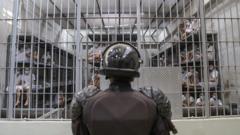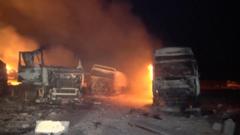As diplomatic talks resume between the US and Iran regarding Tehran’s nuclear ambitions, the delicate balance of regional power dynamics is of prime concern.
US-Iran Nuclear Negotiations Intensify as Israel Monitors Closely

US-Iran Nuclear Negotiations Intensify as Israel Monitors Closely
Amid mixed signals from Washington, all eyes turn to the outcome of crucial diplomatic talks.
As the United States and Iran prepare for another round of talks this Saturday focused on Iran’s nuclear program, Israel remains vigilant about the implications of these discussions. Historically, Israel has relied on tough stances from U.S. leadership to counter potential threats from Iran, especially under President Trump's administration where aggressive measures were previously executed.
In his first term, President Trump authorized military actions, such as the targeted killing of a significant Iranian general and the enactment of severe economic sanctions against Tehran, while also withdrawing from an international nuclear agreement. Currently, with increasing reluctance to engage in further military conflict, Trump is now attempting to pursue a more diplomatic route.
In a series of recent statements, he has warned that the option of military action is still available if necessary but has also urged Israel to refrain from preemptively striking Iranian nuclear facilities while negotiations are underway.
The U.S. envoy leading the discussions, Steve Witkoff, has caused some confusion with varying statements that oscillate between allowing Iran a limited nuclear capability and insisting on the complete dismantling of its nuclear arsenal. Adding to the complexity, Secretary of State Marco Rubio emphasized on his recent visit to Paris that any agreement must ensure Iran’s inability to develop nuclear weapons now—and in the future.
As these negotiations unfold, the global community will be watching closely for potential impacts on stability in the Middle East and beyond.
In his first term, President Trump authorized military actions, such as the targeted killing of a significant Iranian general and the enactment of severe economic sanctions against Tehran, while also withdrawing from an international nuclear agreement. Currently, with increasing reluctance to engage in further military conflict, Trump is now attempting to pursue a more diplomatic route.
In a series of recent statements, he has warned that the option of military action is still available if necessary but has also urged Israel to refrain from preemptively striking Iranian nuclear facilities while negotiations are underway.
The U.S. envoy leading the discussions, Steve Witkoff, has caused some confusion with varying statements that oscillate between allowing Iran a limited nuclear capability and insisting on the complete dismantling of its nuclear arsenal. Adding to the complexity, Secretary of State Marco Rubio emphasized on his recent visit to Paris that any agreement must ensure Iran’s inability to develop nuclear weapons now—and in the future.
As these negotiations unfold, the global community will be watching closely for potential impacts on stability in the Middle East and beyond.





















